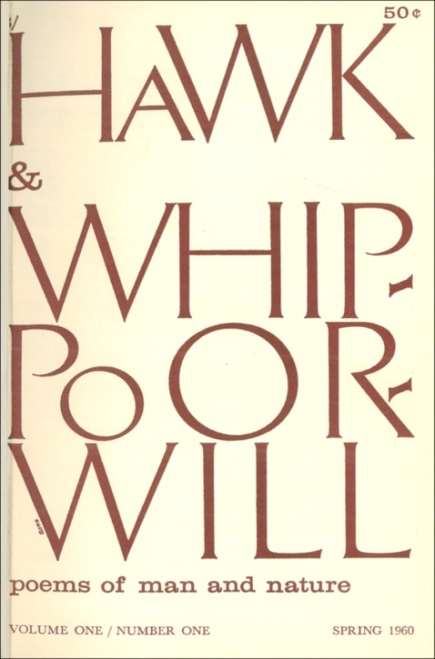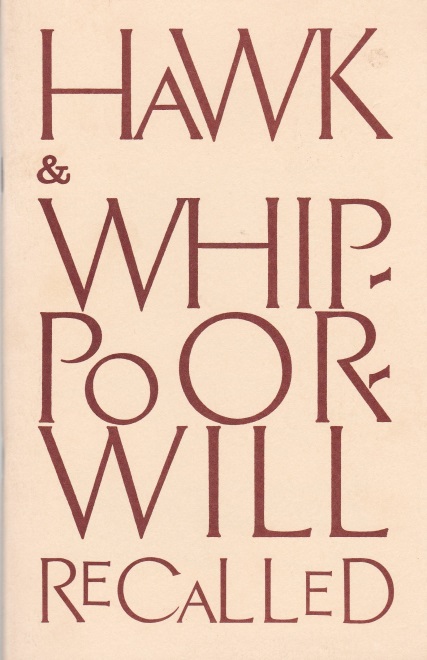(Part 2)
Perhaps it was natural that I should eventually gravitate to editing a little review of poetry. I had been reading such little reviews from the 1920’s onward, and I wanted to learn for myself what editing and publishing such a little review entailed. I began Hawk & Whippoorwill in 1960 and ended it in 1963 after 10 issues. At the outset I hoped to publish a little magazine, limited to verse—“of man and nature,” as I announced it—along similar lines to Fred Lape’s Trails, one of the best such magazines of the 1930’s.
(1971: Lecture, “My Life in Poetry”)
The first hint that publishing a review was on August Derleth’s mind appeared in the January-February 1960 issue of Oak Leaves: A Magazine of Poetry. In the short essay “The Writer and the ‘Little’ Magazine,” Derleth reminded readers that the “principal function of the little magazine for the writer is to afford him an audience—very often his first audience.”
Portentously he adds: “not to be overlooked” are the publishers, “who are usually the editors,” and are “as much in the service of literature as the writer, and often at considerably more cost.”
Derleth was himself an editor and publisher, with three imprints of his own: Arkham House: Publisher, Mycroft & Moran, and Stanton & Lee. Personal experience had taught him that small publishers fill an important role by offering “encouragement or advice” to aspiring writers. He also knew the “mortality rate” among small publishers to be “very high.”
I had previously been associated with a rather costly little review, The Midwestern, published by a university student who had money enough to support it for two or three issues, really rather more a dilettante venture than a bona fide little magazine. And I had edited and published The Arkham Sampler, a trade quarterly specifically for the patrons of Arkham House, with the circulation of which I had no particular problem. Hawk & Whippoorwill, however, had no waiting audience, and, in contrast to the Sampler, which had no competition whatsoever, Hawk & Whippoorwill was but one of many such little reviews in the field. I planned a magazine of 20 pages, chiefly poems, with a modicum of reviews, and for the first issue I had poems from poets like Fred Lape, Jesse Stuart, Raymond Roseliep, Edna Meudt, Joseph Payne Brennan, Joseph Joel Keith and others—all bylines familiar to readers of contemporary poetry. (“My Life in Poetry”)
Derleth produced The Arkham Sampler only two years, 1948 and 1949, but for many years he edited the Arkham House advertising bulletins as if they themselves were Little Reviews, including prose, poems, appraisals and publishing news of interest to his customers. In an unpublished essay, “American Regional Poetry,” Derleth makes this observation: “Regional poets in the first forty years of this century had many outlets in scores of regional little reviews and in the national literary quarterlies. Today there are very few regional little magazines left.”

Derleth decided to set an example.
That the contents of Hawk & Whippoorwill were on the whole appreciably superior to those of most of its contemporaries was not, of course, an accident. Most of the best poems were solicited from poets who had been friends for years. Jesse Stuart was a friend of almost 25 years’ standing; I had been the judge in the Kaleidograph book publication contest in the year that Edsel Ford’s initial book placed first; I had published Joseph Payne Brennan under my Arkham House imprint; I had shared programs with Helga Sandburg; some of the poets had contributed to Poetry Out of Wisconsin a quarter of a century before; and so on. Occasional excellent poems came in unsolicited, and in two cases my admiration for their work overcame a natural reluctance to approach poets I did not personally know and ask for work—and these were Gene Baro and William Stafford. (“My Life in Poetry”)
Derleth’s high standards extended behind the scenes:
I did have offers of funding; those same generous patrons whose names had appeared on the roster of patrons for many another little review offered support. I felt I could not accept such support; I wanted the magazine to make its own way or to cease publication. I intended to keep up a relatively high average in its contents, and to that end subsequent issues featured poems by, in addition to the poets already mentioned, Wendell Anderson, Felix Pollak, William D. Barney, Gene Baro, John Beecher, Lorna Beers, Grant Code, Carleton Drewry, John Engels, James T. Farrell, Edsel Ford, James Hearst, John Judson, Raymond E. F. Larsson, David Lytle, Barriss Mills, Sydney King Russell, Arthur Sampley, Helga Sandburg, Daniel Smythe, William Stafford, Felix Stefanile, Jane Stuart, James L. Weil, Norma Farber—whose long Frostian takeoff, “Stopping by Woods on a Snowy Evening,” was, I think, the most memorable poem to appear in the magazine—and by many other poets, whose names would be almost as well known to this audience, as these.
Though Derleth wrote verse prolifically throughout his career, only four of his poems appeared in the ten issues of Hawk & Whippoorwill—each issue 35 to 40 pages long, with the final issue twice that length. But he did contribute eight brief reviews of other writers’ books, prepare detailed notes for all ten installments of “The Editor’s Post,” and compile for the final issue a complete index of all ten.
In the Autumn 1963 issue, Derleth bid farewell to Hawk & Whippoorwill, in the short essay “On Publishing a Little Magazine,” which begins: “I undertook the publication of Hawk & Whippoorwill, determined to bring out at least ten issues….” He goes on to explain: “Four years of Hawk & Whippoorwill have persuaded me to conclude that there is very little room for such a magazine on a self-sustaining basis, for there is not a sufficiently large or interested public devoted.” To illustrate his point, he adds:
Subscribers to the first year of Hawk & Whippoorwill numbered approximately two hundred; subscribers to the last numbered less than half that number … It should be made clear at once, however, that no very great effort was ever expended to gain subscribers for the magazine; the press of my many obligations forbade it and left me no time in which to do more than assemble the magazine, proof it, and mail it to subscribers when it came from the printer….
But this scheduled, separate appearance of Hawk & Whippoorwill was not quite the end. After its mailing, Derleth calculated the number of complete sets of all issues that could be assembled from his file of unsold copies—and bound in cloth. Later that same year, he offered 170 of these in pale green.

Nor was that monument the end.
In 1973, two years after Derleth died, a new Little Review appeared, “edited, published and presented by the Wisconsin Fellowship of Poets.” This first issue of Hawk & Whippoorwill Recalled was entirely “devoted to the memory of August Derleth” and the “high literary standards of the original magazine” it emulated.

The cost of this project was “jointly supported by a grant from the Wisconsin Arts Council and the National Endowment for the Arts in Washington, D.C.”
John D. Haefele submitted this article.
© 2016. All rights reserved.

September 11th, 2016 at 11:59 am
[…] Coming next: “Hawk & Whippoorwill: Derleth’s Little Review” (Part 2) […]
November 1st, 2016 at 6:30 pm
[…] (Read Part 1 and Part 2) […]